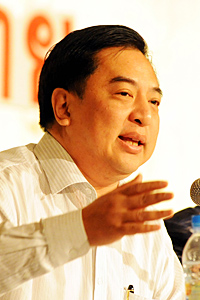
The government's latest attempt to regulate traffic involving the use of pickup trucks is put on hold at least until the Songkran weekend is over. The saga reflects the long neglect in enforcing the law, the Thai attitude of mai pen rai -- it doesn't matter -- and the patronisation by the ruling class.
It's well known that our laws, on the environment, child and human rights protection, labour, healthcare and welfare are quite progressive and up to international standard.
It's the interpretation of the intention of the law by responsible authorities and enforcement that are the problem. There are complaints regarding abuse of the law, excessive use of discretion by the authorities, or corruption.
There are cases of negligence – some authorities do not want to bother or just adopt the couldn't care less attitude as they think the punishment would not fall upon them. And many cases reflect how the law and regulations do not reflect the reality and way of life.

Suranand Vejjajiva was secretary-general to the prime minister during the Yingluck Shinawatra government and is now a political analyst.
Take this current controversy as an example. The law prohibits the use of pickup trucks including those with an extended seat behind the front for transporting people. But the truck-makers and the modification shops do tinker a bit to satisfy consumer needs.
For a developing country with a vast rural farm area and sprawling urban cities like Thailand, pickup trucks serve as multi-purpose vehicles: for loading goods and materials to markets or working sites, among other functions. Passengers, especially labourers, can squeeze into the back on weekdays, while extended families travel together on the back of the truck on weekends.
Pickup trucks are popular due to their practicality and friendly price tag, especially when compared with vans or station wagons. But because the vehicles are not designed to carry passengers, we all know safety has long been compromised.
The government and the police are not wrong in acting, as they recognised how laws have been broken. However, they must not forget the laws have not been enforced from the very beginning.
Manufacturers, retailers, modification shops and most importantly the consumers have absorbed the pickup trucks into their way of life. Everybody says "mai pen rai" and "bad things won't happen to me". Let the less unfortunate (through karma) meet their fate. Or the ignorant and drunks probably deserve it.
So, if the government feels the need to protect its citizens with road safety practices, for the sake of an individual and the impact of an accident caused by the individual on others, then it is commendable. But the changes they want to make cannot be accomplished overnight.
The government should think through the processes of bringing change in public practices and behaviour. For instance, the enforcement could limit the prohibition only for vehicles using superhighways. Those who rely on the slower local roads can be exempt.
Alternative transportation modes must be offered -- buses, trains or boats. And make them convenient and cheap. Anyone who has used trains in Japan will realise how easy and speedy they are.
Intermodal modes at the stations make connecting to other types of transportation hassle-free. A grace period for adjustments for everyone involved is needed including a PR campaign to create understanding.
And the government must know by now that they cannot change people's behaviour in a drastic manner, a few days before a long weekend when the people made their plans and decided how they will travel. The government has no one to blame but itself for the outcry.
The curious must ask why the government took this approach? First, this is a military government. The military, trained to receive orders and do what it is told, thinks running a government is the same. We see good, let's do it! Why question the good intention of a leader?
If riding in the back of a pickup truck is dangerous, then an order will solve the issue. If street food hawkers are messing the sidewalks, then they issue an order. If scantily-clad girls dancing at Songkran festivals are inappropriate, an order will make them wear Thai traditional costumes.
Following orders is essential in the battlefield, but not in administrating public policies and certainly not in the area relating to freedom of expression and way of life.
People cannot be coerced into doing things, even for their own benefit. They have to be convinced and learn to obey the laws and observe etiquette in living with others.
Essentially, they must understand how to respect the rights and liberties of others. And for a society to function, discipline through rule of law and good cultural practices is also needed. A programme to teach civic duties is as important as physical infrastructure development.
Besides, there is also an issue of patronage and subsequent patronising behaviour. All Thai governments and leaders fall into playing the role of the good patron -- we see it more with authoritarian ones, and less with democratically elected ones -- but they all have it. It is also the attitude of the Bangkok elites and the technocrats: "We know better" and "we know more".
The patrons believe they occupy the moral high ground, superior to others. The masses cannot think for themselves. They must be told and ordered. The patrons preach decency in a self-righteous manner. When put into the context of a military mindset, the results are what this government is occupied with.
But as leaders patronise, they also discriminate. The rich have options. Drive a Ferrari leading to a hit-and-run manslaughter -- one can be off the hook. The poor rural and urban masses have no choice but to follow the game being set and played.
Wealth inequality degrades the population and injustice leads to animosity. The condescending policies and the manner of forced implementation make matters worse. It creates an inferiority complex which is like a powder keg ready to explode.
